Lord Owen's Lady est un film Britannique avec Rubina Ali
Lord Owen's Lady

Si vous aimez ce film, faites-le savoir !
- Infos
- Casting
- Infos techniques
- Photos
- Vidéos
- Passages TV
- Citations
- Personnages
- Musique
- Récompenses
Durée 2h
OrigineRoyaume-uni
Lord Owen's Lady is an upcoming film set between the UK and India featuring several of the stars of Slumdog Millionaire including Rubina Ali, Azharuddin Ismail and Ayush Mahesh Khedekar and a strong supporting cast of up-and-coming British and international talent. The film has already received heavy press coverage due to the considerable interest in the young stars attached. Production companies are Lord Owen's Lady Film Ltd and Dragons Productions (Wales) Ltd.
Acteurs
Commentaires
Postez un commentaire :
Suggestions de films similaires à Lord Owen's Lady
Il y a 45 films ayant les mêmes acteurs, pour avoir au final 45 suggestions de films similaires.Si vous avez aimé Lord Owen's Lady, vous aimerez sûrement les films similaires suivants :
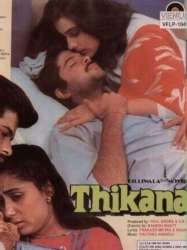
Thikana (1987)
Réalisé par Mahesh Bhatt
Genres Drame
Acteurs Smita Patil, Anil Kapoor, Amrita Singh, Suresh Oberoi, Rohini Hattangadi, Avtar Gill
Note58%





Alcoholic lawyer Ravi Goel (Anil Kapoor) does not get cases because he refuses to lie. He lives with his mother (Rohini Hattangadi) and sister Shashi (Smita Patil), who also happens to be the breadwinner for the family.

यारा दिलदारा (1991)
, 2h30Genres Drame, Romance
Acteurs Aasif Sheikh, Rohini Hattangadi, Amjad Khan, Kader Khan, Saeed Jaffrey, Shakti Kapoor
Note77%





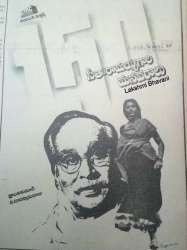 , 2h11
, 2h11Acteurs Akkineni Nageswara Rao, Meena, Rohini Hattangadi, Tanikella Bharani, Kota Srinivasa Rao, Dasari Narayana Rao
Note79%





The plot revolves around an Indian family with close family relationships shot in a village near Godavari river.

Dharam Sankat (1991)
Acteurs Vinod Khanna, Amrita Singh, Dara Singh, Sahila Chadha, Rohini Hattangadi, Amrish Puri
Note42%





Dacait Jagira (Amrish Puri) has terrorized the entire country-side with his raids and cruelty. On one such encounter he kills Gopal's mother, leaving him an orphan. Durga (Rohini Hattangadi) takes care of Gopal and raises him as her own son, Birju. Years pass by, Gopal (Raj Babbar) and Birju (Vinod Khanna) have grown up. While another band of dacaits is raiding their village, the leader Sohn Kanwar (Sahila Chaddha) is about to kill Birju, when she is told that his mother is Durga, and she spares him, due to Durga being the wife of Dara (Dara Singh), another dacait. This revelation unleases a tide of hate against Birju and Durga, and they are forced to leave the village. To make matters worse, Gopal disowns any relationship he has had with both of them, and wants to marry Madhu (Amrita Singh), who loves Birju. Gopal becomes a police inspector, and Birju is forced to bear arms and become a dacait. Birju also brings Madhu with him, and this does not fit in with Sohn Kanwar's plans that she has for Birju. To make matters worse, the Police Commissioner (Vikram Gokhale) issues a substantial reward to bring in Birju dead or alive.

ಮನೆ (1991)
, 1h57Réalisé par Girish Kasaravalli
Genres Drame
Acteurs Naseeruddin Shah, Deepti Naval, Rohini Hattangadi
Note63%





Mane is a Kafkaesque tale about a young couple (Naseeruddin Shah and Deepti Naval) that moves to the city from a village with the hope of finding privacy and freedom, which are unavailable in the joint family system. For all its narrative excursions, in a sense, Mane is merely about the breakup of a marriage in which the Rossellinian couple, unable to confront each other directly amidst the loneliness of the city, externalizes their troubles – his powerlessness, her desire for freedom and their childlessness – and shifts blame on situations beyond their control in order to act victims. Kasaravalli works wonder with film and sound here, using them to denote the impending break down. (One stunning shot uses the neon lights of the neighbourhood to literally break apart the frame). A critique on urban spaces that suffocate more than they promise privacy, Mane unfolds like a sociological update on Rear Window (1954), in which personal anxieties and fears are displaced onto the surroundings and, specifically, onto a lower social class. In that sense, Mane connects all the way to the director’s latest work in the manner in which it raises questions about the visibility of the class structure and the seeming imperceptibility of the consequences of acts of one class on the other. Mane is full of such encroachments of freedom by other competing notions of freedom – between classes, between houses and between spouses.
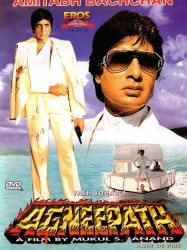
Agneepath (1990)
, 2h54Réalisé par Mukul Anand
Origine Inde
Genres Drame, Action, Policier
Acteurs Amitabh Bachchan, Mithun Chakraborty, Madhavi Alladurgam, Neelam Kothari, Danny Denzongpa, Rohini Hattangadi
Note75%





Un garçon devient gangster pour retrouver le truand qui a tué son père innocent, mais la vengeance et la réparation ont un prix.
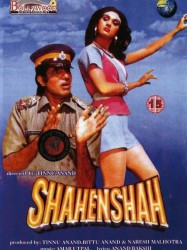
Shahenshah (1988)
, 2h55Réalisé par Tinnu Anand
Genres Action
Thèmes Super-héros
Acteurs Amitabh Bachchan, Aruna Irani, Meenakshi Seshadri, Amrish Puri, Rohini Hattangadi, Supriya Pathak
Note62%





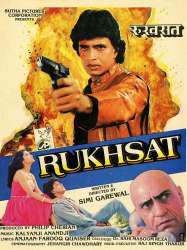
Rukhsat (1988)
, 2h15Réalisé par Simi Garewal
Genres Romance
Acteurs Mithun Chakraborty, Anuradha Patel, Amrish Puri, Simi Garewal, Pradeep Kumar, Rohini Hattangadi
Note72%





Rukhsat is a family drama featuring Mithun Chakraborty and Anuradha Patel in lead roles, supported by Marc Zuber, Pradeep Kumar, Rohini Hattangadi, Amrish Puri and the director Simi Garewal.The film was produced by Philip Cherian.
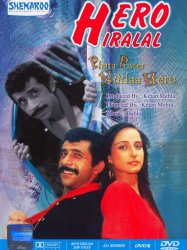
Hero Hiralal (1988)
Réalisé par Ketan Mehta
Origine Inde
Genres Drame, Comédie, Comédie dramatique, Action, Musical
Acteurs Naseeruddin Shah, Sanjana Kapoor, Saeed Jaffrey, Deepa Sahi, Johnny Lever, Kiran Kumar
Note60%





Naseeruddin Shah is Hero Hiralal, a Hyderabadi Auto-driver, who meets an upcoming Bollywood starlet, Roopa (Sanjana Kapoor) and becomes her tour guide. Soon, the two fall in love.

Ek Aadmi (1988)
Réalisé par Khwaja Ahmad Abbas
Acteurs Shabana Azmi, Pankaj Kapur, Parikshit Sahni, Supriya Pathak, Tun tun (Uma Devi Khatri), Tinnu Anand
 Connexion
Connexion



